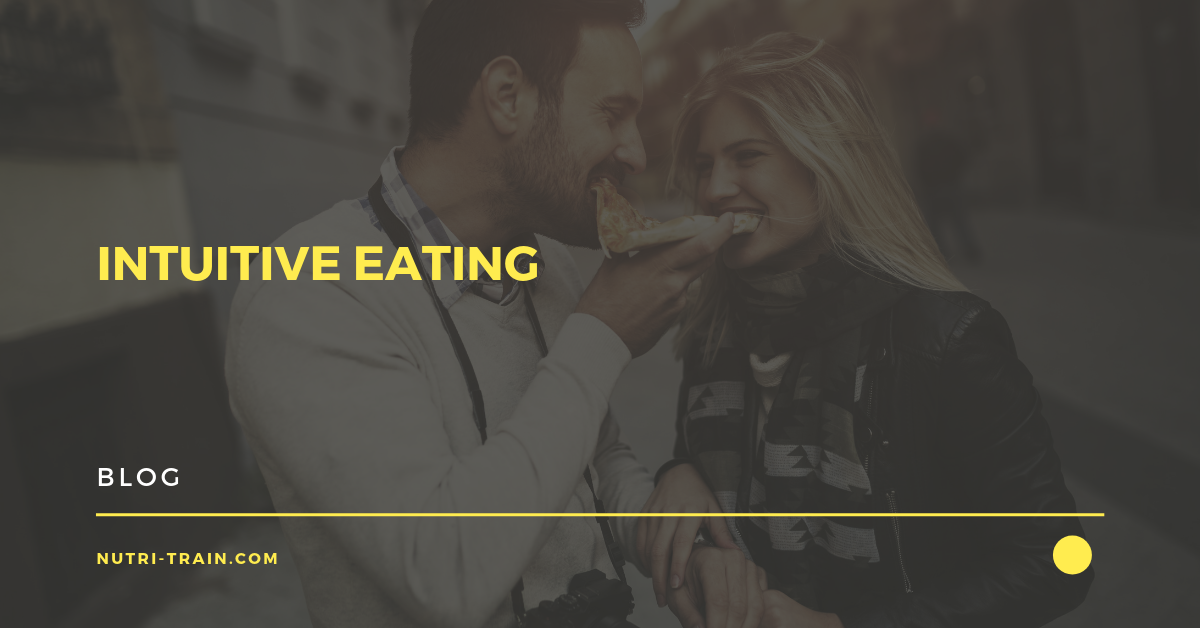|
Intuitive eating is simply the process of:
We live in a world where the scales not only dominate our bathrooms, but our kitchens too. Yet, we’re worse off than we’ve ever been. We’ve already discussed our stance on calorie counting, which is why those of you who’ve struggled with this conventional method will absolutely love intuitive eating. Also known as mindfulness and mindful eating, intuitive eating has been shown to improve individuals’ eating and weight and psychological attachments with weight and body image[1] – mainly because it teaches us about ourselves and why we’re hungry, which we have lost over the years. Mindfulness-based eating appears effective in addressing binge eating, emotional eating and eating in response to external cues,[2] many of which are side effects of calorie counting. Understanding how you react to your external cues, is by far one of the most revealing things about adopting an intuitive eating method, since so many underestimate them. One of my clients would often over-eat post workout. It wasn’t until she started being mindful of her external cues, that she realised how much her exercise regime was affecting her hunger levels. Then, she effectively started to manage her eating by changing up her routine (less HIIT) and making sure she had food with her ready. It’s important to understand that you will make mistakes with this method, but unlike others, we actually welcome these mistakes as they’re a great way to develop our learning and growth. Falling isn’t failing, and the more we begin to understand what doesn’t work, the better we become at doing what does work. Here’s how you can become more intuitive with your eating:
Some of the points above are self-explanatory, but some we’d love to elaborate on. Eating until you’re full, but not stuffed: It’s amazing how many of us take it too far by eating until we’re uncomfortably full, which is the perfect indicator that we’ve overdone it. The feeling of satiety unfortunately isn’t actually to do with our stomach; it’s a reaction in the brain to the chemicals released when we eat, which takes our brain around 20 minutes to register. When you’re starting out, it can be difficult, so remember that you can always have some more food later if you really need to. Drinking water before, during and after a meal: Dehydration can cause sleepiness, fatigue and confusion; plus, it negatively affects your mood.[3] Drinking chilled water around every meal as well as in-between them is key for improving your hunger cues and combating the symptoms mentioned. Enjoy your food: One of the many reasons people fail to adhere to a healthier lifestyle is because they simply don’t enjoy the meals they’re eating. Here’s what we usually see:
Choosing a boring salad instead of your usual shop-bought sandwich, packet of crisps and diet soda isn’t going to keep you fuelled or satisfied, so why do it? Why not try re-creating your sandwich at home with fresher, leaner and healthier ingredients to start with? And swap out the packet of crisps for some homemade spicy nuts? Then, as your confidence begins to grow, you can start looking for alternatives, or simply create your own. Have a little, not a lot: We overeat – it’s as simple as that. However, it’s not entirely our fault. Food companies create items which are 2 servings per pack, yet we rarely stop at 1; and restaurants over-serve the cheapest items on the menu to help bulk out our plates (think chips instead of steak). Have a plan for your guilty pleasures: We all have our ‘guilty-pleasures’, which usually carry an emotional attachment. This means they're ingrained in our identity, making them a sticking point for most. But what if they were simply pleasures? Pleasures which you knew how to handle? Here’s our best advice for managing these types of items:
Then, after around 3 months, identify your boundaries with these items and choose their admission carefully. Abstaining from the items you love will only make you want them more, but be wary as there’s a reason they cause you so much harm. I developed the Capsule Diet™ to help my client achieve a healthier eating plan, without the fuss or worry because life is for living, not weighing your food. Here’s a brief overview of how you should be eating to help maximise your health and wellness and succeed along the way:
I’d love to know what you think. Have you tried intuitive eating? Speak soon, JC. [1] https://www.ncbi.nlm.nih.gov/pubmed/29986603 [2] https://www.ncbi.nlm.nih.gov/pubmed/28718396 [3] https://articles.mercola.com/sites/articles/archive/2017/09/28/dehydration-affects-brain-function.aspx
0 Comments
Leave a Reply. |
AuthorsJC and The Nutri-Team Archives
November 2020
Categories
All
|

 RSS Feed
RSS Feed
